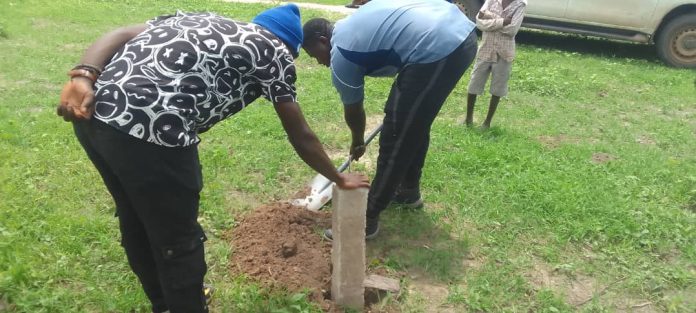By Hatab Nyang and Louise Jobe
Residents of Kartong Village have called on the government to act fairly and transparently in addressing a controversial boundary demarcation exercise involving neighboring Gunjur and Berending. The villagers, who say they were not consulted about the recent exercise carried out by the Department of Lands and Surveys, have rejected the process and expressed fears of losing their farmlands.
The concerns were raised during a community meeting held on Sunday, July 20, 2025, at the residence of the village Alkalo, 94-year-old Demba Jabang. Kartong, one of the oldest settlements in Kombo South, said they were bordered with Sanyang and Sifoe before the establishment of Gunjur. Village elders insist that Kartong predates Gunjur and that over time, Berending emerged on lands originally belonging to Kartong.
At the heart of the dispute is Kartong’s unique geographical location. The village is surrounded by water on three sides, leaving only one side—bordering Gunjur Berending and Madina Salam—for agricultural use. It is this remaining land, villagers say, that is being threatened by the government’s boundary demarcation.
The villagers said the exercise was done without their knowledge or participation, raising questions about transparency and fairness.
“I was at home when someone from the village came to me and told me that officers from Department of Lands and Surveys are demarcating boundary between Gunjur Berending and Madina Salam village escorted by PIU officers,” said Alkalo Demba Jabang. “If the government wants to do a demarcation, they should inform us, and we should be part of this exercise.”
The Alkalo narrated the historical background of Berending’s origins, which he said was based on oral accounts passed down by elders he met in his youth. According to him, Berending was first settled by a man named Buluwa Sanyang, who arrived in Kartong at a young age.
“Buluwa started working at the oyster farm at the Kartong River, farming and cutting down palm nuts until he bought a cow, which became a source of much yield. When he felt he should get married, he went back to Cassamance and then came back to Kartong with his wife. He got 3 sons with his said wife namely Sanna Berending, Ansu and Bakary in Kartong,” Jabang said.
He narrated that Buluwa’s cows once grazed on a farm and he was summoned to the chief in Gunjur. After being convicted and fined six shillings—a sum the chief himself paid—Buluwa was advised to move farther away from cultivated farms.
“That was when they came to give him a place between Gunjur and Kartong which happened to be Berending,” the Alkalo explained. “At that time there was no road between Gunjur/Berending and Kartong/Berending. All goes through the riverside or seaside as that’s a natural road.”
Alkalo Jabang said Kartong has always maintained cordial relations with Gunjur and urged the government to uphold justice in dealing with the land matter. “There has always been a strong relationship between Kartong and Gunjur. We call on the government to play fairly so this bond remains,” he said.
The villagers expressed worry that the demarcation could lead to a loss of farming lands, which are essential for the survival of the community.
Bala Musa Manneh, a native of Kartong, blamed estate agents for encouraging land grabbing across Kombo South. “The land that are encroached is our farms. If they forcibly take it from us, where are we going to farm? It’s like they have taken about more than two kilometres from our lands we depend on,” he said.
Manneh added that Kartong’s geographical limitations make the remaining lands even more vital. “Kartong’s geographical position, surrounded by water on three sides and bordered with Gunjur Berending and Madina Salam village on the fourth side, this makes these lands more critical as they represent the community only agricultural area,” he said.
The government has said the boundary demarcation is aimed at resolving long-standing land disputes in the Kombo South area. Previous confrontations, especially between Gunjur and Berending, have occasionally escalated into violence. However, residents in Kartong say the process lacks community input and risks inflaming tensions instead of resolving them.
In response to the growing concerns, Kartong leaders traveled to Banjul on Monday to meet with officials from the Ministry of Lands, the Department of Lands and Surveys, and other relevant authorities to voice their objections and demand accountability.
Among those voicing strong opposition was Imam Kawsu Manneh, another elder of the village, who issued a warning to the authorities. “Let the government come and remove its borderlines in our bush. We are not going to allow them to take our lands—whether by death or alive, we will take our lands back,” he said.
As tensions rise, villagers say they are not opposed to peaceful resolution but insist that any demarcation process must be based on consultation, transparency, and historical land ownership. For Kartong, the land in question is not just property—it is the last piece of viable farmland on which their livelihoods depend.


















